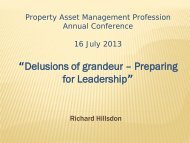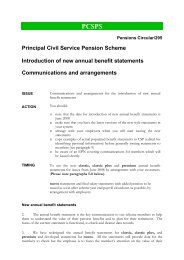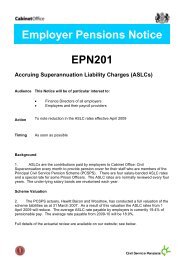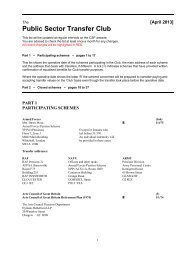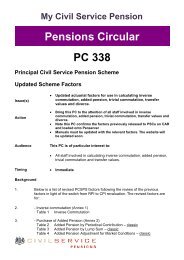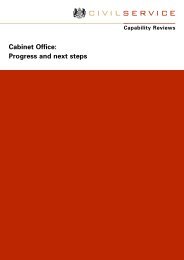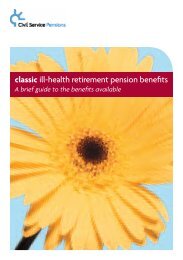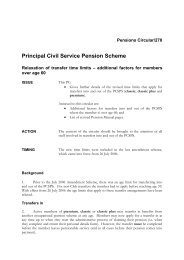Capability Reviews: Progress and Next Steps - The Civil Service
Capability Reviews: Progress and Next Steps - The Civil Service
Capability Reviews: Progress and Next Steps - The Civil Service
- No tags were found...
You also want an ePaper? Increase the reach of your titles
YUMPU automatically turns print PDFs into web optimized ePapers that Google loves.
departments (SCS Survey 2006). It is these leaders in the SCS who are in largepart responsible for performance management of their own staff <strong>and</strong> also forcreating an environment where others manage performance effectively. Whilstdepartments are working to improve, this is a difficult process, requiring bothcultural <strong>and</strong> behavioural change (managers taking their responsibilities in thisarea seriously) <strong>and</strong> also process change (linking individual performanceconsistently to organisational goals). <strong>The</strong> challenge is to improve peoplemanagement as a routine part of effective line management <strong>and</strong> to increasestaff confidence that the skills <strong>and</strong> systems required to manage performanceeffectively are in place.• Better HR. Many departments now have HR directors who are making asignificant impact on HR <strong>and</strong> business strategy. Permanent secretaries <strong>and</strong>boards are engaging with this more seriously, with HR moving up the agenda.<strong>The</strong>re is generally greater awareness that people issues are a core part of thebusiness <strong>and</strong> that HR is more than a transactional function. <strong>The</strong>re is a growingunderst<strong>and</strong>ing of the complexity <strong>and</strong> challenge of people issues we face in achanging world <strong>and</strong> labour market. This is both positive <strong>and</strong> vital. But there is stilla long way to go before Whitehall HR is ‘best in breed’, with professional skillsembedded throughout the workforce.• Skills development. Again, there are positive examples here. Of SCSrespondents, 54 per cent thought their <strong>Capability</strong> Review has been quite or veryeffective at developing skills to meet current <strong>and</strong> future challenges (OLRresearch). But most departments lack a clear skills baseline to build on <strong>and</strong> anunderst<strong>and</strong>ing of their future workforce <strong>and</strong> its skills needs. This means that skillsdevelopment programmes are often short term <strong>and</strong> focused on technical skillssuch as programme management <strong>and</strong> finance.What is the centre doing to build skills, capacity <strong>and</strong> capability?This area is dealt with by a number of different players: the National School ofGovernment, Government Skills, CSCG <strong>and</strong> a number of heads of professionsituated in different parts of the centre <strong>and</strong> in departments. Considerable activity isunder way.• Government Skills, the Sector Skills Council for government, is fully operational<strong>and</strong> has a remit for skills across the whole government workforce. It hascompleted a baseline skills audit of over 40,000 people <strong>and</strong> is developing a skillsstrategy for government. Government Skills is also considering the next phase ofProfessional Skills for Government, including plans to require all those in the FastStream <strong>and</strong> entering the SCS to have a broad range of experience.40 COMMON CAPABILITY GAPS: PROGRESS AND NEXT STEPS



